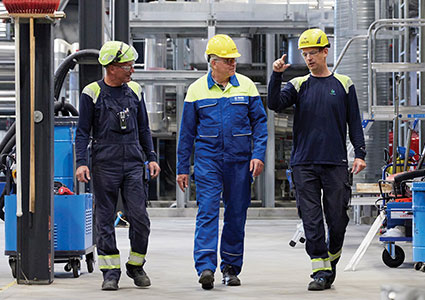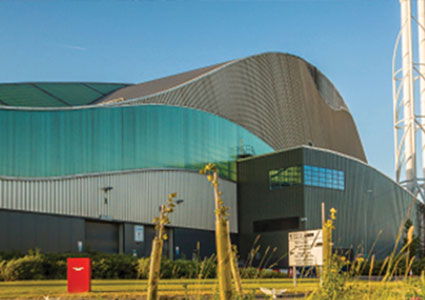
From everyday actions to government policy, no measure is too small for Viridor’s environment strategy
Churchill wasn’t the only leader who subscribed to the idea that attitude is a little thing that makes a big difference. The Director of ESG & External Affairs at Viridor, Tim Rotheray, believes it as well. Viridor, which specializes in waste management and energy sourcing, is on a mission to reignite hope for the future. “Looking at the news,” Tim begins, “it’s so easy to become despondent by the rate of deforestation, impact of fossil fuels and depletion of natural habitats. But when you refocus and look at what is within your control, it makes the approach more digestible, and acknowledging that we can influence the future for the better is what fuels Viridor,” he says.
 Continual commitment
Continual commitment
Viridor is determined to build a world where nothing goes to waste. The company is the largest operator of energy recovery facilities in the UK and processes over three million tons of waste per annum. “We also manage the country’s largest multi-stream reprocessing facility,” shares Tim. “The plastic that you and I use every day? Once you’ve chucked it in the recycling bin each week, we turn that plastic into pellets, and those pellets are processed into the bottles that appear back on store shelves.”
When Tim joined the company, climate change had not yet become an urgent headline, yet Viridor has remained persistent on the matter since its inception. He believes that Viridor’s continual commitment to decarbonization and the circular economy is what separates it from competitors. “We’ve continued to confront the issue head on. Decarbonization in our sector is difficult to perfect, and the solutions are not always obvious. If we’re going to find a way to decarbonize residual waste, we must implement solutions like carbon capture. We’re now working with government to highlight the opportunities that could benefit this sector,” says Tim.
The government plays a key role in legislating policies that outline environmentally friendly practices. However, legislation’s efficiency is contingent on feedback provided by businesses, which means the two must work together for the outcome to be successful. “Waste is a regulated sector. It must be handled responsibly. Therefore, policy is materially important to us as a business, and we have to work closely with government to ensure it is treated safely. Good policymaking is done when government has a clear objective and an agenda. Only when that has been achieved can we actively engage with government and help them understand its limitations. A great example of this is the commitment to Net Zero. The guideline is clear, helpful and steers us towards an achievable ESG strategy. In line with this, we have a commitment to decarbonization, and we’d like to see a similar process take shape with the help of policymakers to implement carbon capture,” expresses Tim.
Full circularity
Another process that can aid in minimizing carbon impact is creating a circular economy. “If it isn’t properly managed, plastic can be really damaging. There’s also value plastic, which can be recycled, reprocessed and displaced as virgin material. We have a commitment to delivering full circularity in all four of the major plastics by 2025.
“Our aim is to get those four main plastic categories to full circularity. We’ve already achieved that with some of them, but it’s tricker with others. Film and polypropylene are particularly difficult. We recently announced our offer to acquire Quantafuel ASA, which is a chemical recycling company that takes waste plastic and turns it back into an oil, which can then be fed back into the plastic manufacturing process, creating full circularity. We are currently looking to finalize that deal quite soon. That will give us a route to achieve full circularity and we will be able to recycle the plastic into fuel.”
The challenge now is to align the company’s supply chain with the circular economy to enable infrastructure investment, and encourage sustainability across all corners of the company. “If we look at our energy recovery, we have long-term, stable contracts with authorities that allow us to raise the necessary capital to build state-of-the-art infrastructure capable of processing that waste. When we struggle to get long-term contracts, it’s much harder to invest in new infrastructure. So, we need to establish how we combat this for greater consistency.”
And Viridor isn’t the only business struggling with this, companies across the UK are in a similar position. “Half of all the recycling sent out by Brits is exported. Each time we export plastic recycling not only do we reduce the traceability of that material, because it’s easier to trace when it’s within the country, but we also export jobs and investment with it as well. For us, that’s a massive challenge because the circular economy cannot be sustained when the product can no longer be traced.”
With this obstacle in mind, Viridor has joined forces with Equitix to build a new Scottish energy recovery facility, to help bring the nation closer to ending landfill. “The project at Westfield is going to process over 200,000 tons of waste in Fife, Scotland. It will be our third waste energy recovery facility. We have one in Dunbar, and we are also actively looking at that site as to whether we can put carbon capture onto it because it’s also next to the Scottish Cluster. We need to minimize the amount of waste that we’re generating across the UK, but if we send waste to landfill, then not only does it emit pollutants, but it also emits methane, which is a highly potent greenhouse gas. So, by taking waste away from landfill, we reduce the emissions per ton by about 40 percent compared to landfill, and we’re looking to achieve that with further investments.”
Solving problems
Tim explains Viridor is also working to ensure that all materials that it extracts, including residues, are recycled. “At the Dunbar facility, waste is recycled and turned into new materials. We have this philosophy of building a world where nothing goes to waste, and we’re working to constantly look at how we can make our processes more efficient, and how we can turn waste into products.”
As Tim shared earlier, it is easy to feel that the challenge to combat climate change is insurmountable. However, he remains hopeful. Across the globe, scientists, engineers, architects, you name it, are all working on solving the most complex problems. Fortunately, measures to combat climate change are not quite as difficult. “The sheer ingenuity of pulling together the kinds of projects we’ve seen is mind blowing. So, we definitely can make a difference. I also believe that I work for a business run by people who are commercially driven to see this business succeed, and the public are pushing us to achieve that as well. The world of finance and investment is heading in the same direction, so we have ingenuity of people, and we have the fuel of the economy pushing in the same direction,” he concludes. In the words of Churchill, it is time to dare and endure. With a strategy like Viridor’s, anything is possible.